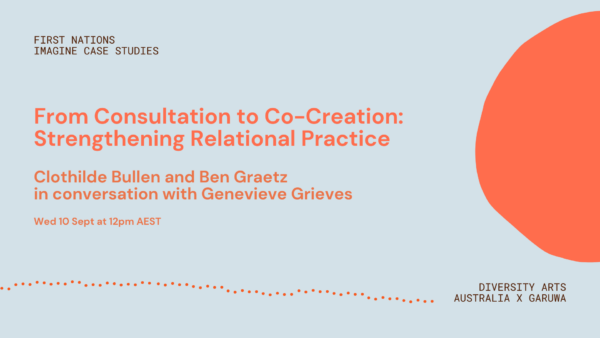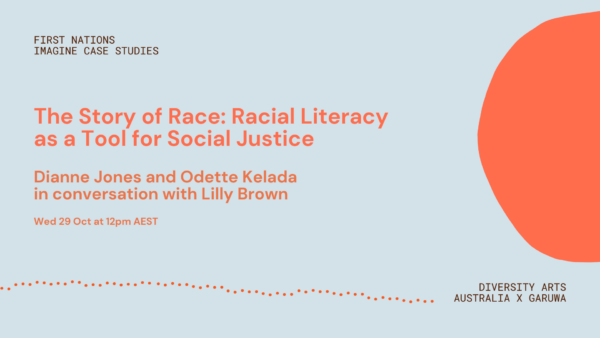MEDIA RELEASE: First Nations Imagine Case Studies: Lunchtime Provocations
As institutions grapple with the consequences of rising racism and polarisation, Diversity Arts Australia, GARUWA and Shifting Ground are demanding more inclusive and equitable futures for the arts and cultural sector. Without a shared commitment to racial equity and justice the frameworks and methodologies that ought to sharpen our practice, deepen relationships, and push for more ethical storytelling are perpetuating hierarchical behaviours.
The cultural sector prides itself on inclusive practices of co-design, equity and diversity, yet do we truly understand who holds power and carries the burden of responsibility in these practices? In the wake of the failed referendum and emboldened backlash against racial justice, the arts claim to stand for progress, whilst avoiding the difficult, yet essential work of reckoning with colonial inheritance and systems that perpetuate racism.
To create a truly inclusive future for the arts, we must strengthen our relational working practices. Join Diversity Arts Australia, GARUWA and Shifting Ground to equip yourself with the tools for understanding racial literacy, navigating systemic barriers and redistributing power and ensure that you are and active participant in ethical, creative and intercultural collaborations. This Spring, the First Nations Imagine Case Studies will reveal a series of provocative conversations with renowned Educator, Lilly Brown (Gumbaynggirr), Indigenous Arts leader, Clothilde Bullen (Wardandi (Nyoongar) and Badimaya (Yamatji), influential Creative Director Ben Graetz (Malak Malak, Kungarakan, Muran Clan (Iwaidja) & Torres Strait Islands (Badu Island), highly respected decoloniser, Genevieve Grieves (Worimi), distinguished Ballardong artist Dianne Jones (Noongar) and celebrated author Odette Kelada.
“From Consultation to Co-Creation: Strengthening Relational Practice”
Clothilde Bullen and Ben Graetz in conversation with Genevieve Grieves
Wednesday 10 September, at 12pm AEST
Co-creation is a commitment to equity, trust and the redistribution of power. This program will demonstrate the critical relationship between self-determination and co-creation, and why ensuring First Nations peoples have control over creative cultural practice is fundamental in ethical, creative collaborations.
We will explore how to strengthen relational practices by identifying who has power and understanding what it means to return it to those who hold responsibility of story, leading us to unpack what ethical collaborations look like and how we can activate models for FN leadership and co-design.
“The Story of Race: Racial Literacy as a Tool for Social Justice”
Dianne Jones and Odette Kelada in conversation with Lilly Brown
Wednesday 29 October, at 12pm AEST
Across the globe we’re witnessing a growing backlash against any work that names systemic racism or colonial power. Theories that help us make sense of race are under attack because they’re effective: they expose the roots of inequality, and demand accountability. If your work engages with First Peoples, culturally and racially marginalised peoples, and communities impacted by injustice, the tools to speak about race and our history can help you identify power and drive real systemic justice, for the benefit of your practice and broader social justice.
Our systems are built to mask racism: to individualise the experience, deflect from it, dehumanise it, and make it unspeakable. This session asks, Who is afraid of race? And why is it so carefully protected?
ABOUT DIVERSITY ARTS AUSTRALIA
Diversity Arts Australia (DARTS) is the national voice for ethno-cultural and migrant racial equity in the arts, cultural and creative industries.
DARTS’s work is underpinned by a human-rights ethic, social justice principles, and the belief that a truly diverse spectrum of creative expression and participation is fundamental to a democratic, inclusive and sustainable creative sector, and society.
Informed by our organisational values of: Inclusion, Diversity, Collaboration, Participation and Self-Determination, DARTS advocates for and actively works towards an arts sector that reflects the complex diversity of the Australian population on our screens and stages; in our audiences, our galleries and books; and within boards, committees, and positions of leadership into the future. We support the creative sector to develop practical and strategic ways to influence the stories and cultural landscape of contemporary Australia.
ABOUT GARUWA
GARUWA is a First Nations-owned and led impact-driven production company that believes in the power of storytelling.
Founded by Worimi siblings Genevieve Grieves and Kieran Satour, First Nations knowledges and culture are central to GARUWA’s ways of being. Grounded in collaborative and holistic approaches we work ethically, respectfully and innovatively to amplify community voices, support the next generation of storytellers and create a better future for generations to come.
ABOUT SHIFTING GROUND
Developed by Dr Lilly Brown (Gumbaynggirr) and Genevieve Grieves (Worimi), Shifting Ground is an Aboriginal-owned and women-led enterprise that supports organisations and individuals from diverse communities, including First Nations peoples, to foster meaningful conversations that connect people’s lived experiences with the broader systems that shape them.
These conversations create safe spaces to develop a critical language and understanding around decolonisation, race, privilege, power and whiteness, cultural safety and intercultural collaboration. They are designed to shape how you think, work, and lead, both personally and professionally, in relation to First Nations people and our shared colonial history and present. By cultivating conscious awareness of power and relationships, Shifting Ground strengthens your capacity to act with purpose on, and navigate the complexities of, issues of culture and race.
__
The Imagine Case Studies project was led by GARUWA with the support of Diversity Arts Australia, in partnership with the British Council of Australia with support from Creative Australia and Create NSW
CONTACT
To request an interview or ask further questions, please contact:
Simone Mugavin
GARUWA
simone@garuwa.com


